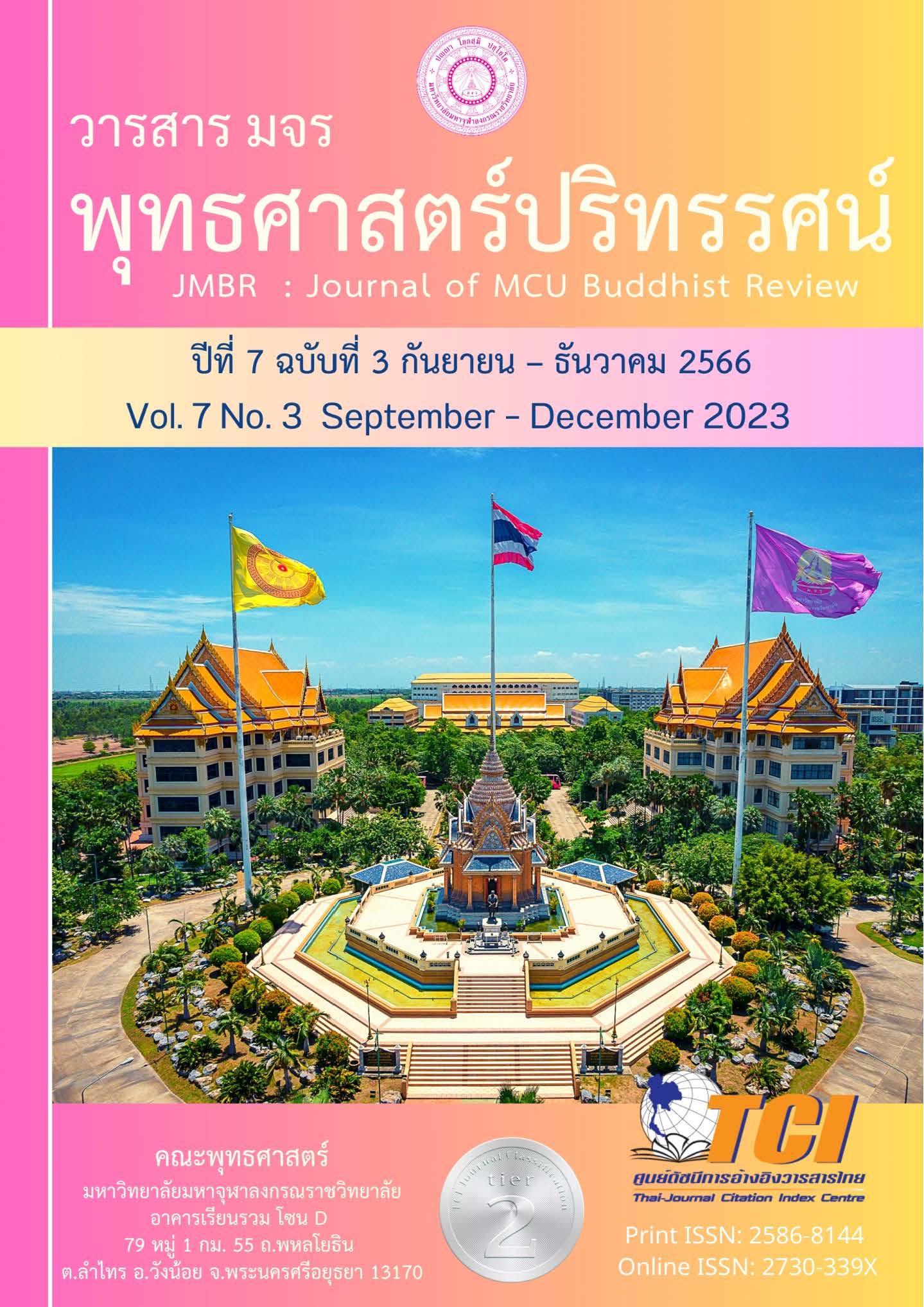ทักษะที่พึงประสงค์สำหรับพระธรรมทูตผู้เผยแผ่พระพุทธศาสนาในต่างประเทศ เพื่อการพัฒนากำลังคนในยุคพลเมืองดิจิทัล
Main Article Content
บทคัดย่อ
การศึกษาวิจัยนี้มีวัตถุประสงค์ 1) เพื่อศึกษาทักษะที่พึงประสงค์สำหรับพระธรรมทูตไทยเพื่อการพัฒนากำลังคนในยุคพลเมืองดิจิทัล 2) เพื่อสร้างภาพในอนาคต ของทักษะที่พึงประสงค์สำหรับพระธรรมทูตไทยเพื่อการพัฒนากำลังคนในยุคพลเมืองดิจิทัลในอนาคต 3) เพื่อวิเคราะห์แนวโน้มการเปลี่ยนแปลงและขับเคลื่อนทักษะที่พึงประสงค์สำหรับพระธรรมทูตไทยเพื่อการพัฒนากำลังคนในยุคพลเมืองดิจิทัลในอนาคต การวิจัยนี้เป็นการวิจัยเชิงคุณภาพ วิเคราะห์และนำเสนอผลการวิจัยเชิงพรรณนา
ผลการวิจัยพบว่า 1) เพื่อศึกษาทักษะที่พึงประสงค์สำหรับพระธรรมทูตไทยเพื่อการพัฒนากำลังคนในยุคพลเมืองดิจิทัล พบว่ามีองค์ประกอบ 3 ทักษะซึ่งครอบคลุมทุกประเด็นสำหรับพระธรรมทูตผู้เผยแผ่พระพุทธศาสนาในต่างประเทศเพื่อการพัฒนากำลังคนในยุคพลเมืองดิจิทัล คือ 1.1) ทักษะการเรียนรู้และพัฒนา 1.2) ทักษะชีวิต 1.3) ทักษะจำเป็นสำหรับการเป็นพลเมืองดิจิทัล 2) เพื่อสร้างภาพในอนาคตของทักษะที่พึงประสงค์สำหรับพระธรรมทูตไทยเพื่อการพัฒนากำลังคนในยุคพลเมืองดิจิทัลในอนาคต และ 3) เพื่อวิเคราะห์แนวโน้มการเปลี่ยนแปลงและขับเคลื่อนทักษะที่พึงประสงค์สำหรับพระธรรมทูตไทยเพื่อการพัฒนากำลังคนในยุคพลเมืองดิจิทัลในอนาคต ซึ่งพบว่าเมื่อการศึกษาความเป็นไปได้และความเหมาะสมของทักษะที่พึงประสงค์สำหรับพระธรรมทูตผู้เผยแผ่พระพุทธศาสนาในต่างประเทศเพื่อการพัฒนากำลังคนในยุคพลเมืองดิจิทัล พบว่าโดยรวมอยู่ในระดับมาก ซึ่งจากผลการวิจัยทำให้ได้องค์ความรู้ใหม่ในการพัฒนาทักษะจำเป็นสำหรับการเผยแผ่พระพุทธศาสนาในต่างประเทศเป็นการปรับกระบวนทัศน์การเผยแผ่พระพุทธศาสนาให้เข้ากับยุคสมัย และรองรับการพัฒนากำลังคนทางศาสนาที่ยั่งยืน
Article Details

อนุญาตภายใต้เงื่อนไข Creative Commons Attribution-NonCommercial-NoDerivatives 4.0 International License.
- บทความที่ได้รับการตีพิมพ์เป็นลิขสิทธิ์ของวารสาร มจร พุทธศาสตร์ปริทรรศน์
- ข้อความใดๆ ที่ปรากฎในบทความที่ได้รับการตีพิมพ์ในวารสาร ถือเป็นความรับผิดชอบของผู้เขียนบทความ และข้อคิดเห็นนั้นไม่ถือว่าเป็นทัศนะและความรับผิดชอบของกองบรรณาธิการวารสาร มจร พุทธศาสตร์ปริทรรศน์
เอกสารอ้างอิง
กระทรวงดิจิทัลเพื่อเศรษฐกิจและสังคม. (2564). พลเมืองดิจิทัลกระทรวงดิจิทัลเพื่อเศรษฐกิจและสังคม. ม.ป.ท.: ม.ป.พ.
พระพรหมคุณาภรณ์ (ป.อ.ปยุตฺโต). (2551). พจนานุกรมพุทธศาสน์ฉบับประมวลศัพท์. กรุงเทพฯ: เอสอาร์ พริ้นติ้ง แมส โปรดักส์ จำกัด.
พระมหาประกาศิต อาจารปาลี. (2556). พุทธบัญญัติเกี่ยวกับนักบวชนอกศาสนา. วารสารสันติศึกษาปริทัรรศน์ มจร. 6(1), 228-309.
พระครูวินัยธรปัญญา ปญฺญาวโร. (2564). การจัดการเผยแผ่พระพุทธศาสนายุคดิจิทัล. Journal of Social Science and Buddhistic Anthropology. 6(4), 423-433.
วิทยาลัยพระธรรมทูต. (2566). รายงานคู่มือพระธรรมทูตสายต่างประเทศ 2566. กรุงเพทฯ: โรงพิมพ์มหาวิทยาลัยมหาจุฬาลงกรณราชวิทยาลัย.
สํานักงานปลัดกระทรวงการอุดมศึกษา วิทยาศาสตร์ วิจัยและนวัตกรรม สํานักนโยบายและแผนการอุดมศึกษา. (2564). แผนด้านการอุดมศึกษาเพื่อผลิตและพัฒนากําลังคนของประเทศ พ.ศ. 2564-2570. ม.ป.ท.: ม.ป.พ.
สำนักงานราชบัณฑิตยสภา พจนานุกรมฉบับราชบัณฑิตสถาน พ.ศ. 2542. เผยแผ่กับเผยแพร่ นำไปใช้ต่างกันอย่างไร. สืบค้น 30 ตุลาคม 2565 จาก http://legacy.orst.go.th/?knowledges81
สุวรรณี ไวท์. (2564). มนุษย์กับความเป็นพลเมืองดิจิทัล. Journal of MCU Humanities Review. 7(2), 339-335.
Homsombat, P. et al.. (2021). Learning Management Emphasizing Desirable Characteristics of Students in Buddhist University. Linguistics and Culture Review.
Jiang Wu and Robert Edward Gordon. (2022). Buddhism and Humanities Education Reform in American Universities. Humanities.


